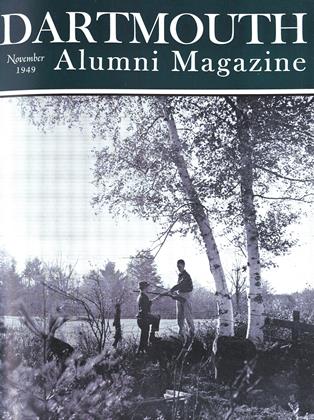THE Convocation exercises, held between two shortened class periods in the morning, drew the usual packed audience in Webster Hall. The faculty, supplying academic color with its gowns and doctoral hoods, occupied the stage; the freshmen had their traditional place in the balcony; and the upperclassmen filled the main floor, all other toe-holds throughout the hall and the campus seats outdoors where a loud speaker carried the program with ample volume. One Main Street merchant, mystified by the campus reverberations from massed voices singing America the Beautiful, rushed up to the Inn corner and asked, "What's going on?" Reassured that he was hearing only the opening exercises, he went back to work.
To the student-faculty audience in Webster and to the men seated outdoors under elms just beginning to take on their autumn yellows, Tom O'Connell '50, president of the Undergraduate Council, addressed a straightforward, well-received statement of the Council's hopes for the new year, with emphasis on the responsibility of each student as a representative of Dartmouth in the eyes of the public.
President Dickey, speaking at greater length than in his previous Convocation addresses, dealt with the College as a cooperative community and with "the exceedingly difficult business of being a useful man." The subject of cooperation led the President into the international field and a discussion of the outlook for a peaceful community of nations. His address in full appears in this issue.
After the singing of Men of Dartmouth, the students resumed their Wednesday morning class schedules. Those with an open period headed back to the dorms to take a few more licks at the job of getting unpacked and settled, or went and stood in line in the bookstores to purchase textbooks and the other appurtenances of the studious life.
The familiar hustle and bustle of opening day was in the air, and the freshmen, who had had the run of the town for a whole week, fell back into a more cowed position, where black-hatted Vigilantes of the sophomore class were willing to keep them. The sharpest evidence of a crowded town was the scarcity of parking space on Main Street and around the campus, a state of affairs not likely to improve until students leave some cars home at Thanksgiving.
Total enrollment for the fall semester, in fact, turned out to be higher than expected. The figure for all departments of the College is 2,935, only 26 less than last year and only 66 below Dartmouth's peak enrollment of two years ago. The freshman class of 705 men heads the list numerically, but the seniors, totaling 701 with 89 mid-year graduates, are not far behind. Sophomores total 676, juniors 627, and unclassified students 11, for a grand total of 2,720 undergraduates.
To this undergraduate figure are added 215 men carrying on post-graduate studies. The Medical School has 81, Tuck School 87, Thayer School 22, Tuck-Thayer 6, and the College proper 17. Associated school enrollments, both graduate and undergraduate, are Tuck School 170, Medical School 102, Thayer School 44, and Tuck-Thayer 13.
The unexpectedly high enrollment of 2,935 men caught the College short in only one respect. Dormitory space was inadequate for several reasons, but to remedy the situation the College was able to provide quarters for 45 unmarried students in apartments in Wigwam Circle. It is expected that they will be there for only one semester, but in these days of postwar preferences there is no telling how fond the bachelors may become of their cooking facilities.
 View Full Issue
View Full Issue
More From This Issue
-
 Class Notes
Class Notes1918
November 1949 By ERNEST H. EARLEY, DONALD L. BARR, DAVID L. GARRATT -
 Article
ArticleConvocation Address
November 1949 -
 Class Notes
Class Notes1897
November 1949 By WILLIAM H. HAM -
 Article
ArticleEnglish Climbing Boys
November 1949 By JOHN HURD '21 -
 Class Notes
Class Notes1923
November 1949 By TRUMAN T. METZEL, COLIN C. STEWART, 3rd -
 Class Notes
Class Notes1912
November 1949 By HENRY K. URION, RALPH D. PETTINGELL, HENRY B. VAN DYNE
C.E.W.
-
 Article
ArticleMiscellany
December 1951 By C.E.W. -
 Article
ArticleHeat and Hubbub
October 1952 By C.E.W. -
 Article
ArticleAthletic Policy
October 1952 By C.E.W. -
 Article
ArticleMiscellany
October 1952 By C.E.W. -
 Article
ArticleA Commentary
JULY 1968 By C.E.W. -
 Article
ArticleThe Dartmouth Alumni Magazine and Operation Moonshooter
OCTOBER, 1908 By C.E.W.
Article
-
 Article
ArticleOUTING CLUB GETS USE OF NEW CABIN
May 1925 -
 Article
ArticleMoore Lectures
April 1937 -
 Article
ArticleLord Dartmouth to the Rescue
January 1952 -
 Article
ArticleA Championship Skipper
October 1956 -
 Article
ArticleThayer's Celebrated ES-21 Offered in Summer Term
JUNE 1965 -
 Article
ArticleINTIMATE GLIMPSES OF GREAT MEN IN THEIR OFF MOMENTS AT THE TIRELESS TENTH
AUGUST, 1928 By Stan Jones

